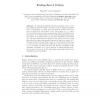Free Online Productivity Tools
i2Speak
i2Symbol
i2OCR
iTex2Img
iWeb2Print
iWeb2Shot
i2Type
iPdf2Split
iPdf2Merge
i2Bopomofo
i2Arabic
i2Style
i2Image
i2PDF
iLatex2Rtf
Sci2ools
126
click to vote
ALDT
2009
Springer
2009
Springer
Finding Best k Policies
Abstract. An optimal probabilistic-planning algorithm solves a problem, usually modeled by a Markov decision process, by finding its optimal policy. In this paper, we study the k best policies problem. The problem is to find the k best policies. The k best policies, k > 1, cannot be found directly using dynamic programming. Na¨ıvely, finding the k-th best policy can be Turing reduced to the optimal planning problem, but the number of problems queried in the na¨ıve algorithm is exponential in k. We show empirically that solving k best policy problem by using this reduction requires unreasonable amounts of time even when k = 3. We then provide a new algorithm, based on our theoretical contribution to prove that the k-th best policy differs from the i-th policy, for some i < k, on exactly one state. We show that the time complexity of the algorithm is quadratic in k, but the number of optimal planning problems it solves is linear in k. We demonstrate empirically that the new...
ALDT 2009 | Algorithmic Decision Theory | Optimal Planning Problems | Optimal Policy | Optimal Probabilistic-planning Algorithm |
Related Content
| Added | 25 May 2010 |
| Updated | 25 May 2010 |
| Type | Conference |
| Year | 2009 |
| Where | ALDT |
| Authors | Peng Dai, Judy Goldsmith |
Comments (0)

